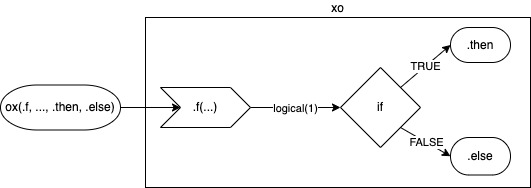| Type: | Package |
| Title: | Shorthand if-Else |
| Version: | 0.1.0 |
| Maintainer: | Dawid Kałędkowski <dawid.kaledkowski@gmail.com> |
| Description: | Short hand if-else function to easily switch the values depending on a logical condition. |
| License: | GPL-2 | GPL-3 [expanded from: GPL (≥ 2)] |
| BugReports: | https://github.com/gogonzo/ox/issues |
| Encoding: | UTF-8 |
| Language: | en-US |
| Depends: | R (≥ 3.0) |
| Suggests: | checkmate, dplyr, magrittr, knitr, rmarkdown, testthat, utils |
| RoxygenNote: | 7.1.2 |
| VignetteBuilder: | knitr |
| NeedsCompilation: | no |
| Packaged: | 2021-12-14 07:10:41 UTC; gonzo |
| Author: | Dawid Kałędkowski |
| Repository: | CRAN |
| Date/Publication: | 2021-12-15 09:00:02 UTC |
Utility function to run OX
Description
Utility function to run OX
Usage
OX_default(
.f,
...,
.then = list(...)[[1]],
.else = rev(list(...))[[1]],
.invert = FALSE
)
Arguments
.f |
( |
... |
arguments passed to the |
.then |
( |
.else |
( |
.invert |
( |
Checks .then and .else for OX
Description
Checks if .then and .else are fine. If they have supported classes and if their length is the same.
Usage
check_thenelse_OX(.then, .else)
Arguments
.then |
( |
.else |
( |
Value
NULL invisible.
Indices inversion
Description
Inverts the indices to select the rest. For example when idx is logical
then [!idx], if integer then [-idx]
Usage
invert_indices(idx)
Arguments
idx |
( |
Value
object identical to idx input but with inverted values.
Short hand if-else
Description
Short hand if-else functions for simple values switching.
Usage
ox(.f, ..., .then = list(...)[[1]], .else = rev(list(...))[[1]])
xo(.f, ..., .then = list(...)[[1]], .else = rev(list(...))[[1]])
Arguments
.f |
( |
... |
arguments passed to the |
.then |
A positive-replacement. NOTE, that if |
.else |
A negative-replacement. NOTE, that if |
Details

ox evaluates function .f which returns a single logical value and
depending on the result ox returns:
on
TRUEreturns.then.on
FALSEreturns.else.
It's important to note is that .then and .else have a default values set
as the first and the last element of the .... This means that they don't
have to be specified if both are arguments of .f.
If any of them are not arguments of .f then this argument should be
specified directly as .then or .else, otherwise it will be passed to the
function.
As, far as .then and .else won't be specified order of arguments in ...
matters for ox but it's up to you if they are passed in the correct order
to the .f. Then one, might consider name the argument so .f will be
executed as expected. Consider following example
greater_than_by <- function(x, y, by) x > (y + by) ox(greater_than_by, x = 5, by = 3, y = 3)
In above, one needs to move y to the end so that it will be considered as
.else.
To invert the switch one can use xo which is equivalent of
ox(Negate(.f), ..., .then, .else).
Value
object identical to .then or .else depending on the condition
result.
Examples
# if (is.null(NULL)) NULL else 1
ox(NULL, .f = is.null, .else = 1)
# if (is("text", "character")) "text" else "not a character"
ox("text", .f = is, "character", .else = "not a character")
# if (1 > 2) 1 else 2
ox(`>`, 1, 2)
# if (!is.null(NULL)) NULL else 1
xo(NULL, .f = is.null, .else = 1)
# if (!is("text", "character")) "text" else "not a character"
xo("text", .f = is, "character", .else = "not a character")
# if (!1 > 2) 1 else 2
xo(`>`, 1, 2)
Check .f output
Description
Checks whether .f has needed length
Usage
validate_f_out(idx, len)
Arguments
idx |
( |
len |
( |
Value
idx if logical and unique(idx) if numeric.
Vectorized ox
Description
Switch the values of the vector by another on specific indices.
Usage
OX(.f, ..., .then = list(...)[[1]], .else = rev(list(...))[[1]])
XO(.f, ..., .then = list(...)[[1]], .else = rev(list(...))[[1]])
Arguments
.f |
( |
... |
arguments passed to the |
.then |
( |
.else |
( |
Details

#' OX evaluates function .f which returns a vector of indices which
are then decide which values of .then are replaced by else.
.then[!idx] <- .else[!idx]
Consequence of above is that idx = .f(...) should be a logical vector or
integer vector which would be valid indices for .then and .else.
This means that .then and .else should be of the same length, but there
are two exceptions:
when
.elseis a single value, than this value will replace.thenat returned indices.then[!idx] <- .elsewhen
.elseisNULL
To invert the switch one can use XO which is equivalent of
OX(Negate(.f), ..., .then, .else).
Value
atomic or list. Returned object is a .then object with elements
replaced by .else depending on a result of the logical condition.
Examples
# switch values of the vector when condition is true
OX(is.na, c(1, NA, 3), .else = c(2, 2, 2))
# use OX to invert negate the condition
XO(is.na, c(1, NA, 3), .else = c(2, 2, 2))